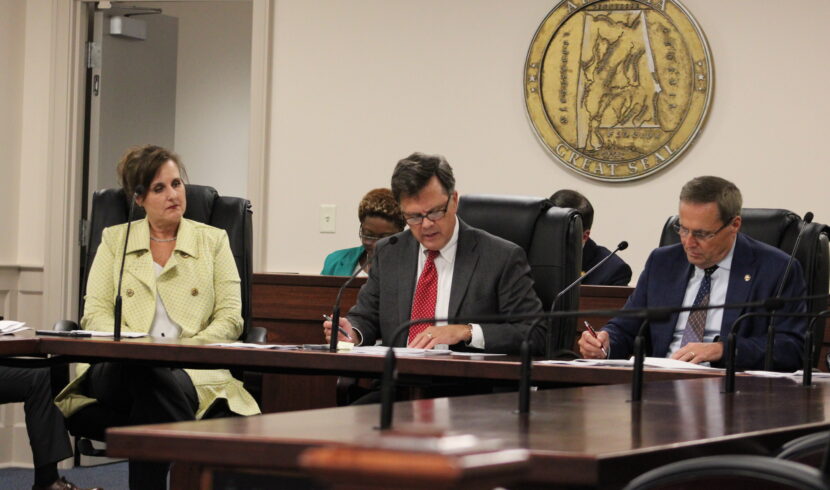The recently passed reduction of the state’s sales tax on groceries from 4% to 2% will take effect in two phases, the second dependent on the growth of total tax revenues into the Education Trust Fund.
Currently the ETF, which supports public education, isn’t growing.
Following two record revenue years in 2021 and 2022, the ETF at the end of May was -1.56% year-over-year, according to a fiscal report released last week. May receipts into the fund were down -6.51% compared to May 2022.
“I’d say it’s possible but perhaps not probable,” Sen. Arthur Orr, R-Decatur, said about the likelihood of the ETF rebounding enough for that second decrease to the tax on food in late 2024.
May was the second consecutive month of decline in the ETF in fiscal 2023, which started in October.
But a slowdown has been expected and Kirk Fulford, deputy director of the Legislative Service Agency and lawmakers’ go-to budget expert, said he’s not overly concerned yet.
“Most of the decline in May, about $67 million, is attributable to an increase in individual income tax refund payments,” Fulford told Alabama Daily News. “Sales tax continues to return to a ‘normal’ growth pattern that is significantly less than the growth over the last couple of years. So, slower, negative growth at this point in the fiscal year was to be expected considering how out of line revenues have been since FY 2021.”
Heavily impacted by federal COVID-19 relief money, revenues into the ETF were a record $10.4 billion in the fiscal year 2022. That was 20.54% above fiscal 2021. In fiscal 2021, growth was more than 11%.
“We are certainly watching revenues, but FY 2023 obligations should not be impacted due to the difference in revenues, even at the current pattern, and appropriations for the current fiscal year,” Fulford said.
For 2024, Fulford in March said his office expected growth in the ETF. A record $8.8 billion 2024 education budget was signed by Gov. Kay Ivey on Thursday.
A tax cut, with guardrails
Lawmakers on Thursday sent Ivey a plan to reduce the state’s sales tax on grocery items from 4% to 3% on Sept. 1. Then, it would decline to 2% in September 2024 if state estimates for revenue growth in 2025 are at least 3.5% above 2024. That will be known in early 2024, Fulford explained.
If that growth requirement isn’t met for 2024 the tax cut can happen in a subsequent year.
When fully implemented, the cut is expected to save Alabamians — and cost the ETF — more than $300 million per year.
The bill previously required 2% growth in the ETF. The Senate increased it to 3.5% on Thursday.
“We can’t have that second penny being dropped and we have a flat revenue year or even 2% growth to be able to bear the $150 million we’d lose in that particular year,” Orr, chairman of the Senate education budget committee, said.
While the Senate increased that growth threshold, it also moved from 2025 to 2024 the second reduction date, meaning, growth pending, the cut could happen sooner.
Fulford said it is reasonable to think that 3.5% growth is attainable.
“That is in line with average growth in the ETF since 2011 of 3.7%, throwing out the last couple of years of extraordinary growth” he said. “Average growth since 2001 is roughly 3.3 %.”
Like Fulford, Rep. Danny Garrett, who chairs the House education budget committee and sponsored the grocery tax bill in the House, said May numbers were skewed by income tax refund payments.
“But it’s clear the hockey stick trajectory that we’ve seen since the federal money came to the state — we’re not seeing that any longer,” Garrett, R-Trussville, told ADN.
In addition to the sales tax reduction, lawmakers also approved last week Rep. Anthony Daniels’ bill to untax at least some of the overtime earned by hourly workers in the state. The bill caps at $25 million the annual impact of that cut. There were also at least $150 million in incentive cap increases related to economic development this session.
Both Garrett and Orr agreed they now want to monitor the ETF before state leaders consider any other significant revenue changes to the ETF.
“Whatever we do needs to be sustainable,” Garrett said.
Said Orr: “We’ll need to let the economy play out in the next 12 to 18 to 24 months.”
In the General Fund, May receipts were up 22.62% year-over-year.
“The General Fund continues to clip along with double-digit growth that is mostly attributable to interest on state deposits,” Fulford said. “I have cautioned everyone that this revenue source will decline as quickly as it has increased this year when the Fed decides they have inflation under control, if possible.”

